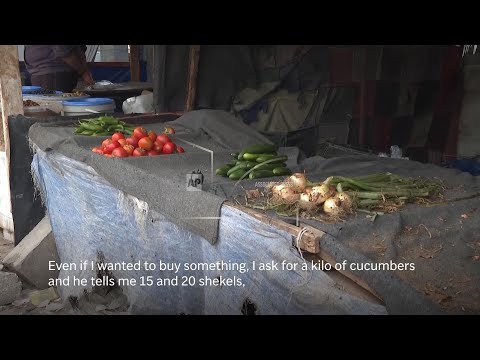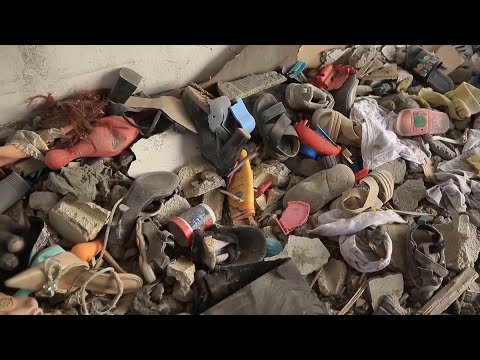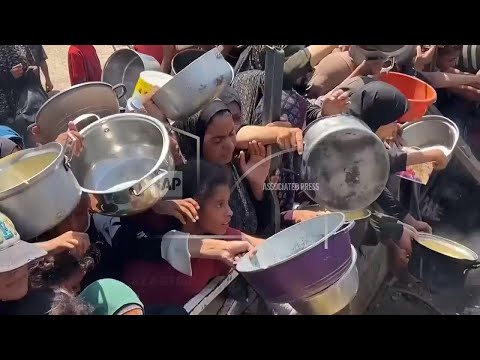(27 Apr 2025)
RESTRICTION SUMMARY:
ASSOCIATED PRESS
Khan Younis, Gaza Strip – 24 April 2025
1. Various of tomatoes and small quantities of vegetables displayed for sale at stalls
2. Rotten tomato
3. Boy sorting display
4. SOUNDBITE (Arabic) Khalil Abu Ghraieb, citizen from Khan Younis:
"I can’t find anything to buy. Even if I wanted to buy something, I ask for a kilo of cucumbers and he tells me 15 and 20 shekels, tomatoes 30 shekels, an ounce of peppers is 10 shekels, how many thousand shekels do we have to buy? How much are potatoes today? He says a kilo of potatoes is 40 and 45 shekels. I have 8 and 9 people, how many fruits do I need to feed them? What is happening to us?”
ASSOCIATED PRESS
Khan Younis, Gaza Strip – 25 April 2025
5. Women carrying pots of food and placing on the ground inside a tent, children sitting on the ground waiting for food
6. Various of women pouring cooked rice and peas
7. SOUNDBITE (Arabic) Mariam al-Najjar, displaced from Rafah:
"Today is Friday, we are supposed to cook chicken, meat, maqluba (a Palestinian dish), stuffed vegetables. Today we are cooking peas and rice. We did not know canned peas before the war, we know it during the war. We did not see canned beans, we did not see them in our lives only when this war began, which destroyed us and destroyed our lives.”
8. Various of Najjar family eating inside their tent
STORYLINE:
For nearly 60 days, no food, fuel, medicine or other item has entered the Gaza Strip, blocked by Israel.
Aid groups are running out of food to distribute.
Markets are nearly bare.
Palestinian families are left struggling to feed their children.
In the sprawling tent camp outside the southern city of Khan Younis, Mariam al-Najjar and her mother-in-law emptied four cans of peas and carrots into a pot and boiled it over a wood fire.
They added a little bouillon and spices.
That, with a plate of rice, was the sole meal on Friday for the 11 members of their family, including six children.
Among Palestinians, “Fridays are sacred,” a day for large family meals of meat, stuffed vegetables or other rich traditional dishes, al-Najjar said.
“Now we eat peas and rice,” she said. “We never ate canned peas before the war. Only in this war that has destroyed our lives.”
The around 2.3 million Palestinians in Gaza are now mainly living off canned vegetables, rice, pasta and lentils.
Meat, milk, cheese and fruit have disappeared.
Bread and eggs are scarce.
The few vegetables or other items in the market have skyrocketed in price, unaffordable for most.
“We can’t get anything that provides any protein or nutrients,” al-Najjar said.
Israel imposed the blockade on March 2, then shattered a two-month ceasefire by resuming military operations March 18.
It said both steps aim to pressure Hamas into releasing hostages.
Rights groups call the blockade a “starvation tactic” endangering the entire population and a potential war crime.
Item by item, foods have disappeared, al-Najjar said.
When meat became unavailable, she got canned sardines.
Those are gone.
They used to receive cartons of milk from the U.N.
That ended weeks ago.
Once a week, she used to buy tomatoes to give her children a salad.
Now she can’t afford tomatoes.
Now, they are on a routine of cans of beans or peas and carrots, she said.
When they can’t find that, they get lentils or pasta from a charity kitchen.
If she finds bread or sugar, she gives her kids bread dunked in tea to stave off their hunger, she said.
Hundreds of thousands live in tent camps.
Find out more about AP Archive: http://www.aparchive.com/HowWeWork
Twitter: https://twitter.com/AP_Archive
Facebook: https://www.facebook.com/APArchives
Instagram: https://www.instagram.com/APNews/
You can license this story through AP Archive: http://www.aparchive.com/metadata/youtube/839d124465ba498e9c4eb59dcf8833b5
Author: AP Archive
Go to Source
News post in May 2, 2025, 9:04 am.
Visit Our Sponsor’s:
News Post In – News





